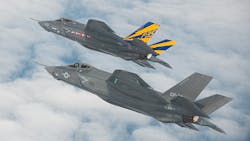Aerospace, Defense Companies Jumping on Blockchain Train
The potential benefits of blockchain technology appeal to the aerospace/defense sector with 86% of them expect to integrate blockchain into their corporate systems within three years, according to a new research report, ”Launchpad to Relevance: Aerospace & Defense Technology Vision 2018,” from Accenture.
The sector views blockchain’s secure, immutable and decentralized features as a way to help reduce maintenance costs, increase aircraft availability, and minimize errors in tracking aircraft parts.
“Blockchain is well-suited to improve the performance of one of the world’s most complex, globally interconnected and security-dependent supply chains,” said John Schmidt, who leads Accenture’s Aerospace & Defense practice globally. “This elegant and paradigm-shifting technology has the potential to deliver profound benefits for the hundreds of suppliers typically involved in the manufacturing of a single aircraft.”
The 86% of respondents from aerospace and defense companies who said they plan to integrate blockchain in their corporate systems by 2021 was higher than the percentage for all but two of the 18 industries surveyed as part of the broader research.
The survey findings point to numerous data challenges that blockchain technology can help address. For instance, the research found that more than two-thirds (70%) of the aerospace and defense executives surveyed believe that companies will be grappling with growing waves of corrupted insights as more falsified data infiltrates their data-driven information systems.
In addition, nearly three-quarters (73%) of them believe that organizations are basing their most critical systems and strategies on data — yet many have not invested in the capabilities to verify the accuracy of that data. And the same number (73%) also believe that automated systems create new risks, including fake data, data manipulation and inherent bias.
Blockchain can help ferret out falsified data and verify its veracity because it provides a secure and unchangeable data chain. The technology can also help track and provide consistent aircraft configuration data throughout the supply chain, as aircraft manufacturers, maintenance providers and airlines currently keep track of configuration data in their own systems yet rarely if ever integrate that information with other companies’ data.
“Knowing the actual configuration of an in-service aircraft at any point time is important,” Schmidt said. “Blockchain enables aerospace and defense companies to securely share, capture and authenticate data from a single source.”
In another Accenture report, titled "Extending the Digital Thread With Blockchain," Accenture found that blockchain can be used in tandem with digital twins — which are digital representations of physical objects — and can be a supporting technology within a powerful tool known as a digital thread. A large and diverse collection of interwoven data flows, a digital thread can provide more-efficient methods of sharing data throughout the product design, manufacturing and maintenance lifecycles, translating to faster and less expensive production, superior maintenance, and on-time upgrades.
“Blockchain, digital twins and digital threads are coalescing into a powerful combination of technologies that will launch the industry to higher levels of performance, data veracity, security and efficiency,” said Craig Gottlieb, a principal director in Accenture’s Aerospace & Defense practice.
Trends in Industry
The aerospace and defense report is derived from Accenture Technology Vision 2018, the company’s most-recent annual technology report that predicts key technology trends likely to disrupt business over the next three years, including artificial intelligence (AI) and virtual/augmented reality. Among key findings from the aerospace and defense executives surveyed about these technologies:
- Two-thirds (67%) said their companies will invest in AI in the next year, with many focusing initially on production, security, and research and development.
- Four in five (80%) said they expect that every human in their workforce will be directly affected daily by an AI-based decision by 2021.
- More than half (57%) will invest in augmented reality and virtual reality in the next year, and nearly all (96%) believe extended reality will help close the physical distance gap when engaging employees or customers.
